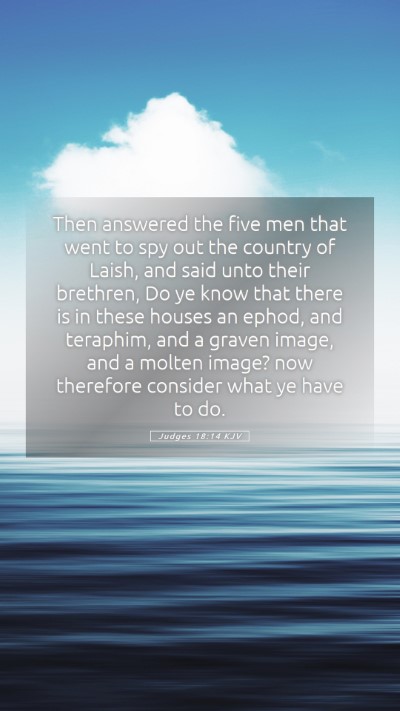Understanding Judges 18:14
Judges 18:14 states, "Then the five men who had gone to spy out the country of Laish answered and said to their brethren, ‘Do you know that there are in these houses an ephod, and household idols, a carved image, and a molded image? Now therefore, consider what you should do." This verse highlights a critical moment in the narrative of the Danites as they scouted the land of Laish, leading to significant implications for their actions and a broader understanding of the dynamics within the Israelite community.
Bible Verse Meanings
This verse emphasizes themes of inquiry and decision-making, serving as a pivotal point for the Danites as they make a strategic choice to invade Laish. The spies report the presence of an ephod and various idols, prompting their group to deliberate on their next steps.
Bible Verse Interpretations
- Spiritual Insight: The mention of "an ephod" signifies a direct connection to the priestly duties and the seeking of divine guidance within Israelite tradition. The spies might see this as an opportunity for potential religious manipulation.
- Cultural Understanding: The household idols represent the Canaanite cultural influences the Israelites faced. This verse indicates the blending of cultures and the struggle against idolatry that plagued Israel during this period.
Bible Verse Understanding
Analyzing Judges 18:14 with a keen eye reveals the underlying tensions in Israelite society during the time of the judges. The Danites' quest shows a desire for land and resources as well as a cautionary tale about spiritual fidelity.
Bible Verse Explanations
The explanation of this verse underscores the significance of constant vigilance in both spiritual and physical realms. The Danites are informed of available religious symbols but must decide to what extent they will opt for these instead of remaining true to their covenantal faith.
Bible Verse Commentary
- Matthew Henry: Commentary emphasizes the mingling of idolatry within Israel's culture, warning against the ease of absorption into harmful practices.
- Albert Barnes: He highlights the implications of the spies' findings and stresses the contrasting priorities of worship and land acquisition.
- Adam Clarke: Clarke notes the dangers of looking to the nations for spiritual guidance, implying a critique of the Danites' decisions.
Scripture Analysis
This analysis leads to a broader reflection on the societal and spiritual challenges that ancient Israel faced. Individual choices often had widespread consequences, illustrating the interconnectedness of community decisions and divine expectation.
Biblical Exegesis
Exegetically, this passage calls for contemplation of how actions stem from information and desire. The Danites’ plan to seize Laish underlines the prophetic warnings against straying from God’s commandments.
Bible Study Insights
For those engaged in Bible studies or personal devotions, this verse provides a poignant reminder to seek God's wisdom in decision-making while being wary of the allure of secular practices and beliefs.
Related Bible Cross References
- Judges 17:5 - Relating to the establishment of idolatry.
- 1 Samuel 15:23 - Discussing rebellion as the sin of witchcraft.
- Exodus 20:3-6 - The first two commandments centering on idolatry.
The consequences of the decisions made in Judges 18 reveal not just the fate of the Danites but also serve as historical lessons for modern audiences examining the meaning of Bible verses in context.
Conclusion
Judges 18:14 opens a window into the complexities of faith, culture, and community in ancient Israel, offering rich insights for believers today. Whether in Bible study groups, personal devotional time, or online Bible study, this passage warrants deep reflection on its implications for faith and practice.


